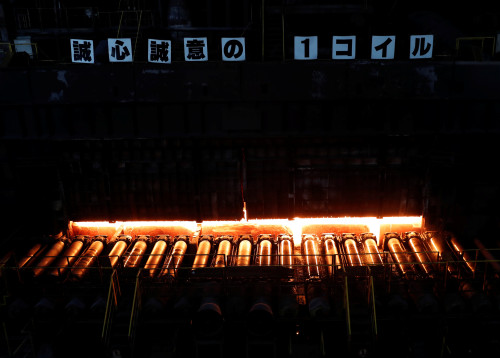By Alexandra Alper
WASHINGTON (Reuters) -Nippon Steel alleges the White House had “impermissible undue influence” over a national security review of its $14.9 billion bid for U.S. Steel and threatened legal action if the deal is blocked.
The accusation was made in a Dec. 17 letter, signed by counsel for Nippon Steel and U.S. Steel and seen by Reuters, to the Committee on Foreign Investment in the United States (CFIUS).
CFIUS, which reviews foreign acquisitions for national security risks, has a Monday deadline to approve the deal, extend the review, or recommend that President Joe Biden scuttle it. However, an expected government shutdown would pause the clock, CFIUS lawyers said.
Last weekend, CFIUS set the stage for Biden, who has long opposed the tie-up, to block it in a 29-page letter by raising allegedly unresolved national security risks, Reuters exclusively reported.
In its response, Nippon Steel and U.S. Steel rebut CFIUS’s national security arguments and allege that Biden improperly influenced the review’s outcome before CFIUS could reach its conclusions.
Specifically, their Dec. 17 letter claims Biden may have weighed in on the deal to please United Steelworkers (USW) President David McCall, who opposes the tie-up, and endorsed Biden for President soon after he announced his opposition to the merger.
Biden has opposed the deal because he believes that U.S. Steel should be American-owned and operated.
“We are gravely concerned that the December 14 Letter reflects impermissible influence in the CFIUS process from the White House, at the behest of third parties who oppose the transaction and seek to weaken the Parties, namely, Cleveland-Cliffs…, led by CEO Lourenco Goncalves, and Mr. McCall,” Nippon and U.S. Steel’s latest response to CFIUS reads.
Cleveland-Cliffs was a suitor for U.S. Steel and also opposes the deal with Nippon.
White House spokesperson Saloni Sharma said the allegation “is not true.” She did not specifically address if Biden would block the deal, adding, “The President has been clear that he will continue to see what the CFIUS process yields.”
“We look forward to finalizing the transaction and remain committed to working with all relevant parties to do so,” U.S. Steel said in a statement.
Nippon Steel and Cleveland Cliffs CEO Lourenco Goncalves declined to comment.
HIGH-LEVEL OPPOSITION
The proposed tie-up has faced high-level opposition within the United States since it was announced a year ago, with both Biden and his incoming successor Donald Trump taking aim at it as they sought to woo union voters in the swing state of Pennsylvania, where U.S. Steel is headquartered. Trump has also asserted the iconic American company should remain American-owned.
The merger appeared fast-tracked to be blocked after the companies received an Aug. 31 letter from CFIUS, seen by Reuters, arguing the deal could hurt the supply of steel needed for critical transportation, construction and agriculture projects.
But Nippon Steel countered that its investments, made by a company from an allied nation, would in fact shore up U.S. Steel’s output and won a 90-day review extension. That extension gave CFIUS until after the November election to make a decision, fueling hope among supporters that a calmer political climate could help the deal’s approval.
“PERSONAL ASSURANCES”
In making the case that President Biden was doing a favor to McCall, the letter cited a February USW news release in which the union leader stated, “Today we received personal assurances that President Joe Biden has our backs,” McCall said. “He’s always been a friend to the American worker and our union, and we’re grateful he’s taking an interest in this matter.”
The White House denied the allegation Biden’s opposition is at the behest of McCall and referred Reuters to his March statement against the deal. McCall said in a statement that “Nippon’s efforts to circulate unfounded rumors and threats of legal action are regrettable, but ultimately, they’re no more than a distraction from the dangers the company’s acquisition of U.S. Steel poses.”
If Biden blocks the deal, “the Parties would immediately file a petition in the U.S. Court of Appeals for the DC Circuit challenging the decision as a violation of due process and the authority of the President,” under CFIUS authorities, Nippon Steel writes.
(Reporting by Alexandra Alper; Editing by Anna Driver)












